History From the Margins: UMS is bringing Druid Theatre's productions of Sean O’Casey’s "Dublin Trilogy" to the Power Center

“The whole world’s in a terrible state of chassis!”
—Captain Boyle
Juno and the Paycock
In 1916 a large part of the world was in chaos and crisis. World War I was tearing Europe apart, and in Ireland, the leaders of anti-British forces saw an opportunity to rise against a pre-occupied British government and attempt to finally drive the British government from Ireland.
The deadly events of what is remembered as the Easter Rising were the beginning of a violent eight-year period that would in time free Ireland from British rule but at a high cost. Following the Rising, a war of independence began, ending with a treaty to give Ireland Free State status while still bonded to Britain. That treaty led to a civil war pitting defenders of the treaty against those who believed the treaty was a betrayal.
Playwright Sean O’Casey grew up in the tenements of Dublin. He was a self-taught reader, a laborer, a railway worker, and eventually, a writer with a keen ear for the language of his native city. In the 1920s, he created three plays that covered the period from the Easter Rising to the Civil War. Each play centers on the lives of tenement dwellers in the Irish capital who become caught up in the frenzy and frustration of the long-running domestic war. O’Casey’s plays are both comic and tragic as well as deeply humane.
The University Musical Society (UMS) is presenting the Druid Theatre’s production of O’Casey’s Dublin Trilogy, under the direction of Druid founder and artistic director Garry Hynes, October 18-21. The Galway-based theater company is bringing the play to New York City and Ann Arbor only.
Hynes was artistic director for Druid Theatre from 1975 to 1991 and again from 1995 to the present. From 1991 to 1994, she was the artistic director of the famed Abbey Theatre, where many of O’Casey’s plays premiered.
In a telephone interview, Hynes said O’Casey’s trilogy is about the working people of Dublin living in the tenements.
Insatiable Appetite: Encore Theatre serves up a delicious “Little Shop of Horrors”
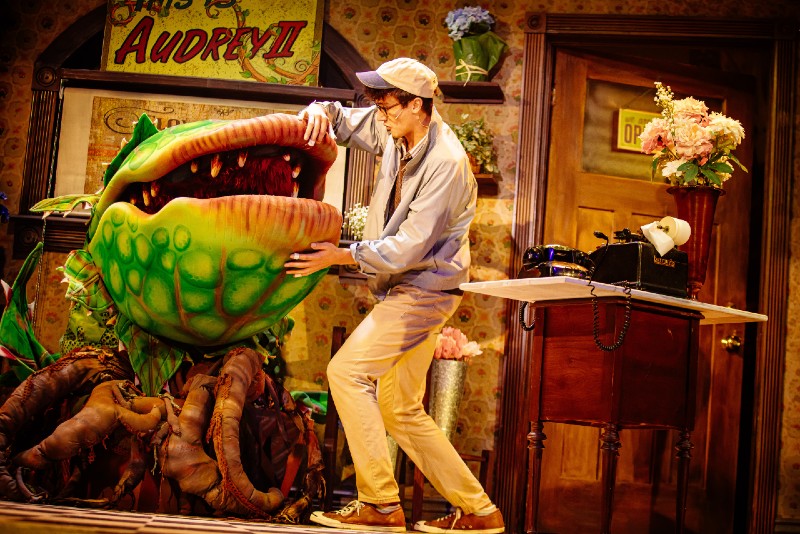
Feed me!
The Encore Musical Theatre Company is serving up a feast of fun, a musical time trip to 1960, and a charming story about an odd plant who develops a taste for human blood.
Little Shop of Horrors is not your typical musical, and it wasn’t your typical horror movie when B-movie master Roger Corman directed the screwball movie that inspired a hilarious and oddly lovable musical.
Little Shop of Horrors opened off-Broadway in 1982, with book and lyrics by Howard Ashman and music by Alan Menken while Ashman also directed. The team went on to help rescue Disney animation with hit songs for The Little Mermaid, Beauty and Beast, and Aladdin. Little Shop won raves off-Broadway and moved to Broadway for more acclaim. That led to another movie, the musical version.
The setting is 1960. A nebbish named Seymour Krelborn is laboring under slave conditions at Mushnick’s Florist at starvation wages and few prospects. He is hopelessly in love with Audrey, who also works at Mushnick’s, and is beginning to feel something for sweet, kind Seymour. But she’s currently going with a sadistic biker/dentist, a deadly combo.
Encore Theatre's "42nd Street" brings excellent energy to a classic backstage story
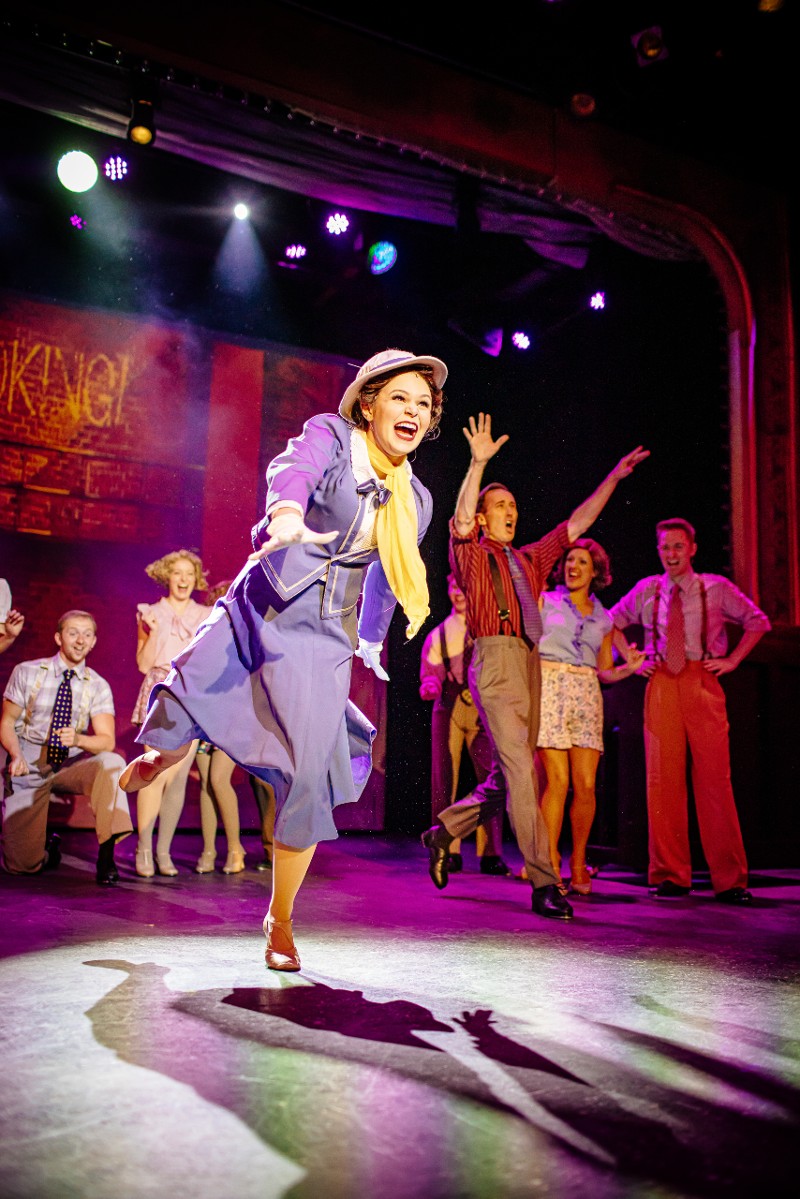
The Encore Theatre’s production of 42nd Street is a great burst of energy, a thunderous display of tap dancing and a funny, charming, nostalgic return to another place and time.
When the curtain rises, the intimate Encore stage is full of rigorously syncopated dancers rehearsing in a frenzy. The bright colors, lights, and energetic tap dancing that open the show display the special mix of Depression-era anxiety and the joy of putting on a musical.
In 1980, Broadway producer David Merrick gambled that the 1933 hit movie musical 42nd Street would find a new audience on Broadway. Under the direction and choreography of Gower Champion, the show struck gold.
The 1933 movie had been a big hit, coming as it did in the midst of the Great Depression, and it acknowledged the hard times while promoting the idea that things will get better—and in the meantime, let’s have some fun. Based on a novel, the musical introduced the classic story of the chorus girl who becomes a star.
A Ghost Story: Purple Rose’s world premiere of the humorous but serious "In Common" explores friends struggling with relationships, past and present

A young woman races about frantically trying on one dress after another. She’s going out to meet with friends who want to introduce her to a man. But she’s not sure she’s ready yet.
Melanie is haunted by a memory. Her friend, confidante, and soulmate was killed after an incident in a bar. She watched it happen and saw him taken away by police. Melanie is white, her friend Cyrus was black. Another case of being in the wrong place, at the wrong time, with the wrong people.
Cyrus died, but to Melanie he’s still alive, still giving her advice, still making her laugh. Recreational drugs and prescribed drugs don’t relieve her sense of guilt. But now, with the help of her friends, she grasps for something new.
The Purple Rose Theatre is presenting the world premiere of playwright Quinn D. Eli’s In Common, a play that balances a caustic sense of humor with a serious look at complicated relationships in a complicated urban environment.
Director Rhiannon Ragland and her excellent cast get the balance just right. The setting is, as Eli notes, “American, urban, Brooklynesque” and the time is “two years after Obama.” Things are more than a little uneasy, but Melanie and her friends are working through it.
Gilbert and Sullivan’s 1881 comic opera "Patience" skewers a popular art movement of the day—and the satire still stings
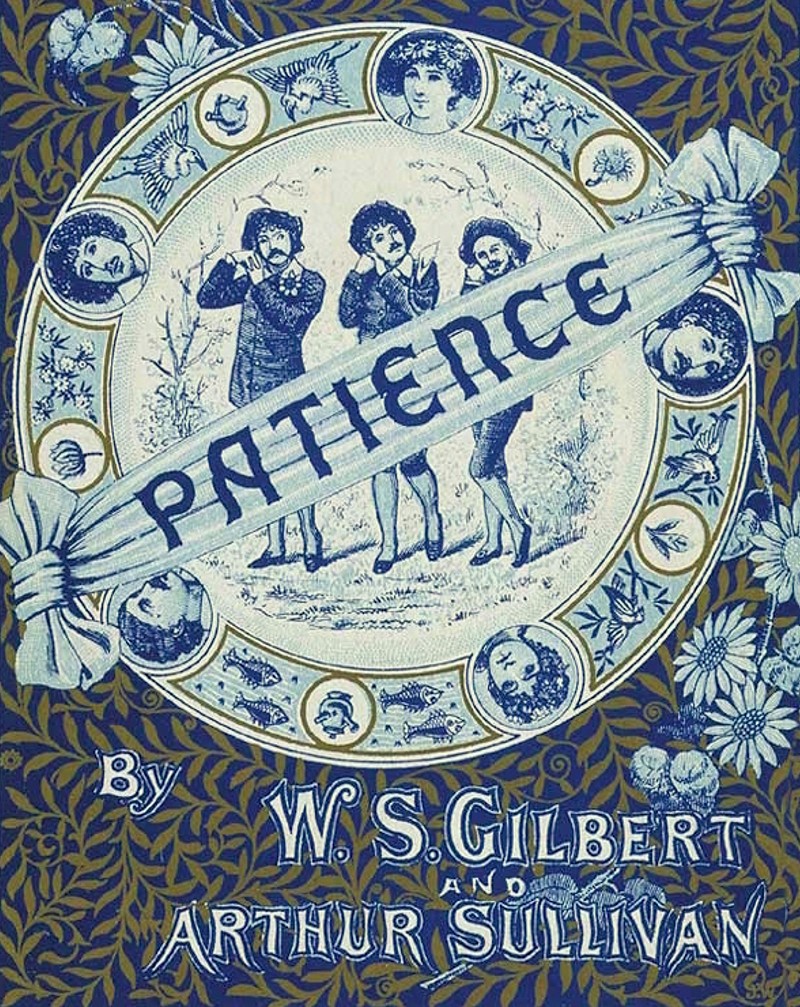
When Gilbert and Sullivan’s operetta Patience opened on April 23, 1881, London’s Savoy Theatre had another hit from the popular duo. Patience had another witty and stinging libretto from W.S. Gilbert and a witty and lush score from Arthur Sullivan.
Gilbert and Sullivan once again tapped into the latest fad by lampooning the aesthetic movement of the 1880s and '90s. The art-for-arts-sake approach to the arts, including theater, was itself a critique of art with a message or political manifestos. Though the movement preceded Oscar Wilde, he is often cited as an example of the aesthetic approach.
Over time, Patience has not been performed as frequently as Gilbert and Sullivan’s other comic operas, HMS Pinafore, The Pirates of Penzance, and The Mikado.
Cameron Graham is directing the University of Michigan Gilbert and Sullivan Society production of Patience, which runs April 13-16 at the Lydia Mendelssohn Theater, and believes it has a lot to say about our own self-involved times as it did when it first wowed the London audiences.
Three Years Later "The Fourth Messenger" Gets Midwest Premiere at The Ark on March 18
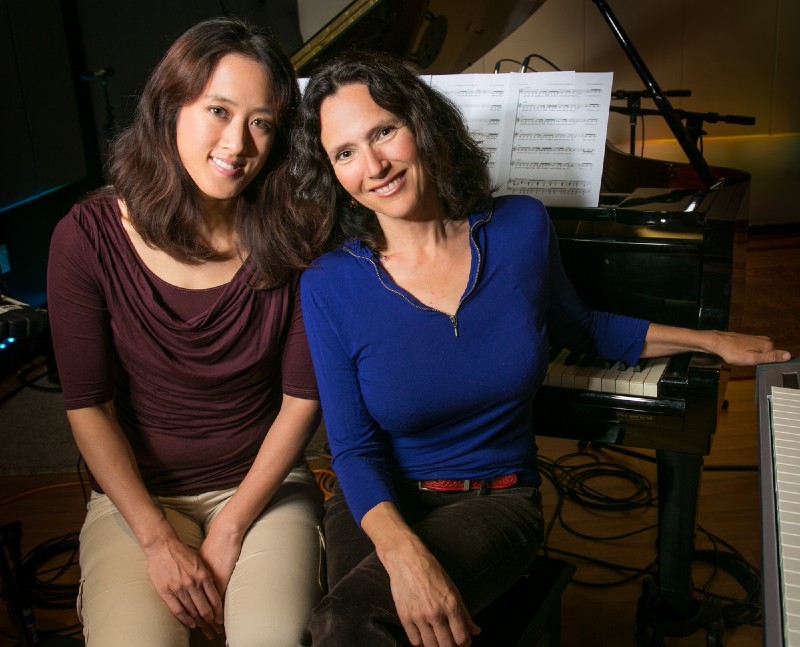
Three years ago, The Ark was set to be the venue for the Midwest premiere of The Fourth Messenger, a musical with a modern perspective on the life and teachings of the Buddha. Then the pandemic hit and the musical was canceled.
Now, almost three years to the day, The Fourth Messenger, with book and lyrics by Tanya Shaffer and music and additional lyrics by Vienna Teng, will finally get its Midwest premiere at The Ark on March 18. The concert-style performance will be a benefit for The Ark, Ann Arbor’s popular home for folk, jazz, and alt-country.
In an interview with Shaffer in 2020, she described what inspired the musical while she was on a spiritual retreat.
“The idea came to me on a nine-day silent retreat when I was supposed to be clearing my mind,” she said. “I was thinking about the story of Buddha’s enlightenment, where he was found under a tree and vowed not to get up until he found enlightenment. Then for many days and nights, all the temptations of the world are trying to get him up. And it came to me that it would be cool as a song and dance, the temptations standing under a tree and then thinking the whole story would be a musical because it has that scale of a hero’s quest, and so I got excited on the retreat and for many hours forgot about my breath and I thought about the musical.”
Shaffer didn’t pursue the idea for another five years. She said she had trouble deciding how to handle the story about the historical Buddha and his teachings.
“I started to think how would people view this story if it was a woman, and I wanted to update it and make it feel very relevant and contemporary,” Shaffer said. “So it took me five years to find my way into it and then many years to workshop.”
The Fourth Messenger premiered at the Ashby Stage in Berkeley, California, in 2013 and was presented at the New York Musical Festival in 2017.
Encore Theatre’s "Once on This Island" combines lilting songs, dynamic dancing, and caustic social commentary

Deep bass drums beat out a rhythm inviting people to dance. They dance to keep alive their spirits and their culture. They dance with joy, but life is never easy, even on a Caribbean island—especially when the island is Hispaniola and the country is Haiti.
Haiti is a troubled land. It has been hit hard by earthquakes, hurricanes, and a long history of unstable governments.
But the people of Haiti are resilient and fight back time and again. They also are in a divided country. There is a racial divide between the wealthy mixed-race elites and the struggling peasant class.
Once on This Island is based on Rosa Guy’s novel My Love, My Love. Lynn Ahrens’ book and lyrics for the musical Once on This Island combine a love story with a caustic take on class in the Caribbean. Stephen Flaherty composed the music that combines Caribbean beats for lively dances and soaring pop music for plaintive songs of yearning.
The Encore Musical Theatre presents an energetic, even passionate, production of the Ahrens-Flaherty musical through March 12 at the Maas Performance Center in Dexter.
An Honest Mistake: Purple Rose Theatre’s “Human Error” Uses Comedy and Relationships to Bridge the Nation’s Growing Political Divide

It’s no secret, this is a divided country. The chasm has widened between liberal and conservative, rural and urban, and religious and not so much. We don’t talk to each other; we scream at each other.
Playwright Eric Pfeffinger takes this disturbing truth and imagines what would happen if right meets left under unusual circumstances in Human Error, a comedy having its Michigan debut at the Purple Rose Theatre Company in Chelsea.
Madelyn and Keenan, described as NPR-listening, latte-sipping blue staters, have gone to a fertility clinic in hopes of starting a family. Unfortunately, as a nervous doctor tells them, their fertilized embryo has been implanted in another woman’s uterus.
Heather and Jim, described as small-government, churchgoing, card-carrying NRA members, agree to meet with Madelyn and Keenan, and after discovering they don’t have horns, Heather agrees to give the liberal couple the baby when it’s born.
Director Lynch R. Travis and his uniformly excellent cast do a good job of balancing Pfeffinger’s mix of broad comedy and heartfelt connections. The set is simple and spare. White chairs become a car, storage bins, and love seats. The stage backdrop is a set of curved gray-white walls for easy entries and exits. The audience is not distracted by scenery from the point the playwright hopes to make.
U-M students go back to the Victorian era in Oscar Wilde’s “The Importance of Being Earnest"

It was still early in rehearsals and cast members were beginning to master an unfamiliar language as well as a different set of values in a distant time. It was the ’90s when a queen reigned and defined an age.
No, not the 1990s, the 1890s.
That’s when Oscar Wilde’s The Importance of Being Earnest made its debut.
The University of Michigan School of Music, Theatre & Dance will present Wilde’s giddy and ever-popular comedy February 16-19 at the Arthur Miller Theatre.
Every year musical theater majors at the University of Michigan perform in a non-musical production. It’s all part of making theater students at ease in both musical and non-musical productions and honing their skills.
Production director Vincent Cardinal, a professor of musical theater at the University of Michigan, has directed and produced scores of productions across the country and is also a noted playwright. Cardinal said Wilde makes it easier for the actors to get into the Victorian era.
“You’re never in better hands than someone like Oscar Wilde,” Cardinal said. “Wilde is going to give them great language, really great characters, and they’ll be really good. When not solving problems, they’re becoming really good at their craft.”
Chicago percussionist Kahil El’Zabar brings spiritual energy to Encore Theatre’s "American Songbook" concerts
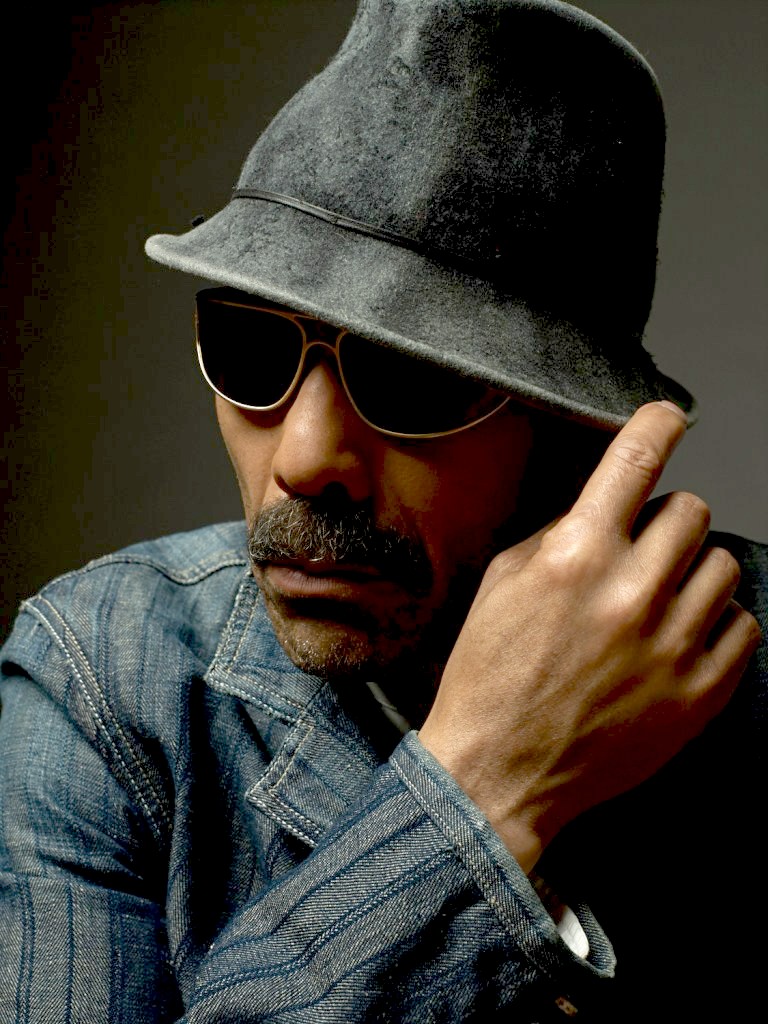
Kahil El’Zabar has a very clear memory of the greatest performance he ever attended.
“I saw [John] Coltrane at a club called McKee’s in Chicago,” the jazz percussionist and band leader said in a phone interview. “I was 15 and [drummer] Elvin Jones went to sleep while he was playing and never lost a beat. The telepathy, the power of communication and connectivity, of mind and spirit in music, that one moment changed my life because I knew that I would want to be part of that embrace for the rest of my life. I would always search for that moment when you are beyond consciousness and can express something greater than yourself. I hope for that every time. When you do it, it is the most exciting and humbling experience you ever experience.”
El’Zabar and his Ethnic Heritage Ensemble will bring his unique approach to the Encore Musical Theatre in Dexter, Feb. 3-4. Last year at about the same time, El’Zabar and his group performed at Encore’s Modern Jazz Meets Musical Theatre; this year the theme is A Modern Exploration of the American Songbook.
The innovative, award-winning musician will celebrate his 70th birthday and the 50th anniversary of the Ethnic Heritage Ensemble next year. His career has been influenced by both his African heritage and growing up in one of America’s legendary jazz cities, Chicago.
El’Zabar’s music has a rich spiritual component that comes from both his experience in Africa and his exposure to the masters of jazz.
“When I came out of Lake Forest College in ‘73, I had an eight-month residency in Ghana,” he said. “I was at the University of Ghana in a city called Legon. Just how people related on a human level, the connection of touch, not just physical but eye and voice and through performance; it seemed to have this spirit that I wanted to retain in my own music.”
As a teenager in Chicago, he got to know performers like Pharoah Sanders, Coltrane, and the Art Ensemble of Chicago. He admired the energy.


































